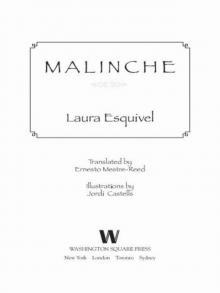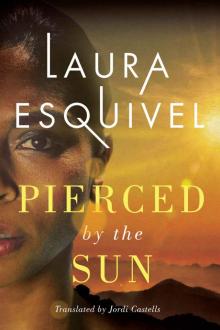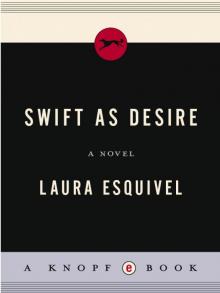- Home
- Laura Esquivel
Malinche Page 7
Malinche Read online
Page 7
Far from there, in the palace of Montezuma, the same conversation had taken place but between Montezuma, his brother Cuitláhuac and his cousin Cuauhtémoc. Cuitláhuac and Cuauhtémoc thought that Cortés and his men, rather than gods arrived from the sea, were a simple band of plunderers. Montezuma, on the other hand, decided that whether or not they were gods, he would give them preferential treatment, since it was considered that even plunderers were protected by Quetzalcóatl. So he sent off his principal envoy with the following message: “Go with haste, make reverence to our lord, saying that his deputy Montezuma has sent you in honor of their arrival.”
Maybe Montezuma was not aware of the great uncertainty that his actions caused among his people, for when they heard that the emperor himself had paid respect to the foreigners, and not just that, but that he put himself at their service, they saw themselves obliged to behave likewise. The preferential treatment toward the Spaniards signified to everyone that the Spaniards were superior to the emperor Montezuma.
But in the light of certain recent events, Malinalli was no longer sure this was so. From the first instance that he had made contact with the messengers from Montezuma, Cortés betrayed his insatiable desire for gold. He wasn’t impressed by the feathered arts, or the beauty of the cloths and jewels with which they paid him respect, but with gold. Cortés had forbid the members of his party from trading gold privately, and he set up a table near the camp so that the natives made their trades officially. Every day Totonacans as well as Mexicas came with offers of gold for Cortés that he traded through his servants for pieces of glass and mirrors, for needles and scissors.
Malinalli herself was given a necklace made with pieces of glass and mirror. She very much liked the reflections it produced. She understood mirrors well. When she washed clothes in the river she examined herself in the water and her reflected image spoke to her of fear. She did not like seeing it, for it bothered her, sickened her. She remembered that once as a girl, when she was ill, they had made her watch her image reflected in a pail of water and she had gotten better. She asked the river to speak to her, to heal her, to tell her if she was doing the proper thing, whether or not she was making a mistake. She knew the waters spoke in all receptacles. Her grandmother had told her that in the Anáhuac region there was an enormous visionary lake, where images of what was to come were reflected on the waters, and in that place the holy men had seen an eagle devouring a serpent. The river where she was washing the clothes, however, did not speak to her, said nothing to her, and she could see nothing in it but the filth from the clothes of the Spaniards arrived from the sea.
The sea was a vast expanse of reflections. The lakes and the rivers, as well. In them were contained the sun and the god of the waters. Malinalli knew that she could find something of herself behind each reflection, like the sun reflected in the moon, as well as in the waters, on the stones, in the eyes of others. When using resplendent stones or objects, one is reflected in the cosmos as in a game of mirrors. The sun doesn’t realize that it shines, for it cannot see itself. It would have to see itself reflected in order to understand its greatness. That is why we need mirrors, to understand ourselves. That is why Tula, Quetzalcóatl’s city, was created to be a mirror of the sky, and that is why Malinalli liked to use shiny objects as mirrors where Quetzalcóatl could be amply reflected. Her necklaces were her most beautiful mirrors.
Taking from her sack the necklace that Cortés had given her, she fastened it around her neck with the intention of being seen by the god. Of meeting him in the reflections. She looked at herself again in the river, and this time the water revealed to her a series of small images, one after the other, in an undulating line. Immediately, it reminded her of the silvery snake that the Spanish soldiers made when they marched one behind the other, the sun reflecting off their armor. She also connected it to the soldiers of Tula, who marched one behind the other, seeing their reflection in the mirror that the one before them carried on his back.
Although Malinalli wasn’t aware of it, Hernán Cortés was only a few steps away from her. Taking advantage of the clear day, he had decided to rest for a moment near the river. A while earlier, he had left off drawing wheels of fortune in his notebooks. Whenever he wanted to relax and clear his mind he would begin drawing wheels of fortune. Doing so, he would enter a state of deep relaxation, pleased by the concept of a circular time that would cause one to be at the bottom one moment and then, just like that, at the top. But that day a new idea came into his mind and forced him to put aside pen and paper. On drawing the part of the wheel hitting the bottom, he felt as if that moment was the most important in the endless process of the turning: the moment that the wheel spins around to the bottom, that instant of bonding with the earth, all the rest is in the air, floating, where neither the future nor the present exist. This new understanding made him lift his eyes and regard his surroundings with fresh eyes.
Immediately he was in a much more agreeable mood. These new lands, which until now had seemed so strange, so dangerous and inhospitable, where the heat and the giant flies, the humidity and the poisonous plants, had terrorized his heart, suddenly changed their appearance, and he found all his surroundings warm and friendly. He felt as if this land was his, that it belonged to him and that, rather than having voyaged there, he had always been there. With great peace in his heart—something foreign to him—he decided to take a swim in the river. When he got to the shore, he discovered that Malinalli was doing the same thing. She had shed her lovely huipil in order to go in.
Cortés caught sight of her naked body, observing her back, her hips, her thighs, and her hair, and was aroused as never before.
Feeling his presence, Malinalli turned, and then Cortés could see her adolescent breasts, firm, enormous, the nipples prominent and pointing directly at his heart. He felt a magnificent erection and with it a huge longing to possess her, but knew he shouldn’t, so he waded waist deep into the cold water to see if it would cool his erection a bit. As he approached her, he tried to begin a conversation that would distract him from his thoughts.
“What are you doing?”
“Immersing myself in the god Tláloc, the God of Water.”
In the water, facing each other, Cortés and Malinalli looked into each other’s eyes and found their destiny and their inevitable union. Cortés understood that Malinalli was his true conquest, that there, in the depths of her black eyes, were the gems he had been searching for all this time. Malinalli, for her part, felt that on Cortés’s lips, in his saliva, there was a taste of the divine, a piece of eternity, and she wanted to savor it and guard it with her lips. The clouds in the sky began to move with extraordinary swiftness. The air became laden with humidity, moistening the feathers of birds and the leaves of trees, as well as Malinalli’s vagina. The gray clouds, like Cortés’s member, made a great effort to contain their waters, to hold back, not to let them fall, so that their precious liquid would not be released. Cortés barely had time to ask, before throwing himself on her, “And what is that god?”
Malinalli still had time to respond before being taken.
“Eternal, the same as yours, but his eternity is not invisible like yours. Our god evaporates, makes designs in the sky, moves whimsically through the clouds, shouts out his presence, spills his consciousness, and quenches our thirst and our fear.”
Cortés, his eyes burning with longing, put his hand on Malinalli’s breast, interrupting her. “Are you afraid?”
Malinalli shook her head. Cortés then caressed her slowly with his wet hand. He took hold of the girl-woman’s nipple with his fingertips. Malinalli trembled. Cortés ordered her to continue speaking about her god. He thought that he would assuage his desire a little, but nothing more. He did not want to break the pact, that all men who were part of this undertaking would respect the native women. Malinalli continued with her speech as best she could, for Cortés had already put her nipple in his mouth and passed his tongue over it lustfully.
“Our
god gives us eternal life…. That is why our god is water. Hidden in the water, in its invisible parts, is the truth, but we do not come to know it unless we weep or die forever.”
Cortés’s ambitious mind could not stand it any longer, and he wanted to possess Malinalli and her god at the same time. In his head there was an explosion of pleasure, and the fire of his heart wanted to evaporate forever that god called Tláloc, that god of water. He lifted Malinalli out of the water and carried her to the shore, where he forcefully penetrated her. At that moment, the sky also exploded and let its rain fall over them.
Cortés did not notice the lightning. The only thing that he was aware of was the warmth at the core of Malinalli’s body and the way that his member pushed and opened the tight walls of the girl’s vagina. He did not care if his passion and force hurt Malinalli. He did not care if lightning struck nearby. All he cared about was going in and out of that body.
Malinalli remained silent and her black eyes, more beautiful than ever, became watery, holding in tears. With each thrust, Malinalli felt the pleasure of Cortés’s naked, hairy torso brushing up against her breasts. This was her answer to her uncertainty regarding what she would feel when she touched hairy skin. In spite of the violence done to her body, in her delirium Malinalli remembered what her grandmother had told her in such a sweet voice—as if the birds, all of them, had imparted their spirits in her throat—on the day before her death.
“There are tears that are the healing and blessing from the Lord of All Things. For water is also a language whose liquid voice sings at the breaking of the light; it is the essence of our god who brings together extremes and reconciles the irreconcilable.”
For a few minutes—which seemed an eternity—Cortés penetrated her time and again, like a savage, as if all the power of nature were contained in his being. Meanwhile, it was raining so hard that his passion and his orgasm were drowned in the rains, as were Malinalli’s tears. She had for the time being ceased to be “The Tongue” to become simply a woman, silent, voiceless, a mere woman who did not bear on her shoulders the enormous responsibility of building the conquest with her words. A woman who, contrary to what would be expected, felt relief in reclaiming her condition of submission, for it was a much more familiar sensation to be an object at the service of men than to be a creator of destiny.
It seemed as if no one else but god had been witness to that outburst of lustful anger, of passionate vengeance, of loving hate, but this wasn’t so. Jaramillo, a captain in Cortés’s army, had seen them. And the figure of Malinalli became engraved in his consciousness and he was attracted, as never before, to this woman whom Cortés, his chief, had possessed.
FIVE
Malinalli and Cortés entered the bathhouse naked. It was surprising to see Cortés free of his garments and appearances. He seemed smaller and vulnerable. The only requisite condition to fulfill that ritual of purification and rebirth was nakedness. For the cleansing of the blood to take place, it was necessary that all the pores of the body expand, open, and in doing so allow the steam, that other image of water, the spirit of water, to purify the body four times, which corresponded to the four cardinal points, the four stations, the four elements.
It was Cortés’s first experience with this sacred practice, which he agreed to participate in at the request of Malinalli. So convinced was she that the gods returned to us our consciences when their essence materialized in the water that she had asked Cortés to relax for a while in the waters before he took any action against the inhabitants of Cholula.
Cortés resisted at first, thinking that the invitation seemed suspicious. What kind of proposition was this, to go into a small circular enclosure that had only one exit, the same as the entrance, and to do so naked and unarmed? The atmosphere in Cholula did not inspire him to have blind faith in anyone. Up to that moment, neither of the two councilors had wanted to receive him. Cholula relied on a worldly councilor, Tlaquiach—lord of the here and now—and a spiritual one, Tlachiac—lord of the world beneath the earth. Both of them lived in houses adjacent to the temple of Quetzalcóatl. The people in Cholula spoke Náhuatl, the language of the empire, and they were subjects of the Mexicas, to whom they paid tribute. But Cholula was an independent dominion and, like Tlaxcala, had a government ruled by various lords. They were a proud people and could not imagine any situation in which their god Quetzalcóatl would fail to protect them, so they did not seem all that fearful of the foreigners. They had plenty of faith in their tutelary god.
Cortés and his men had arrived in Cholula on the way to Tenochtitlán, accompanied by their allies, the Totonacans from Cempoala and the Tlaxcaltecans. The Spaniards entered Cholula after marching the distance of forty kilometers that separated Tlaxcala from Cholula. They were welcomed and fed, but not so the Totonacans and the Tlaxcaltecans, who remained on the outskirts of the city. Only a few hundred went in with the Spaniards, transporting their artillery and other equipment. The reason for this was that the inhabitants of Cholula had old feuds with those of Tlaxcala and in no way would allow them into the city, much less armed.
Cortés was impressed with the beauty and grandness of Cholula. Cholula was a densely populated and prosperous city. Its temples made evident that the city was without doubt one of the most important religious centers of the New World. The main temple, dedicated to the cult of Quetzalcóatl, was the tallest pyramid in Mexico, with 120 steps. Aside from this temple, Cortés counted over four hundred thirty towers, or pyramids, which he called mezquitas, or little mosques. Cholula had some two hundred thousand inhabitants and some fifty thousand houses. It was the most important city that the Spaniards had seen on their long journey inland from the coast. One of its attractions was a huge market whose specialties included feathered works of art, ceramic plates, and precious stones.
But three days after their arrival, the people of Cholula, under the pretext of a shortage of provisions, stopped giving food to the Spaniards, supplying them only with firewood and water. Cortés then had to ask the Tlaxcaltecans to find them food.
There was an atmosphere of suspicion and anxiety permeating the city. Cortés found out from the Tlaxcaltecans that outside the city, troops of Mexicas were gathering. His informants warned him that they were most likely preparing—with the Cholutelcans—an attack on the Spaniards.
Faced with such a climate of intrigue, Cortés had to make a decision. He had already confronted and defeated the Totonacans and Tlaxcaltecans, and had their support, so he had to continue with his plans of conquest. He had to reach Tenochtitlán. He wasn’t going to allow them to stop him. He had to make a fateful decision. He, Cortés, was not a mere soldier, he was the emissary and representative of the King of Spain, and the ambush they were preparing against him, by extension, was an ambush directed against the King of Spain. So he had to act in the name of the crown, defending it resolutely and punishing with death the treason that was being hatched against the King of Spain.
Taking these facts into account, it was logical that Cortés had no wish to enter the bathhouse. He was more concerned with attacking before being attacked, than in participating in some kind of pagan ritual. However, Cortés, who never took more than three steps without a bodyguard protecting him, unexpectedly agreed to go into the bathhouse, where he would be literally a prisoner. The reason for his decision was that Malinalli had explained to him briefly that years before, the Toltecans had overthrown the Omelcans, the ancient inhabitants of Cholula, and in that place had established the cult of Quetzalcóatl, a deity who was associated with Venus, the Morning Star, and who accompanied the sun in its trajectory. Quetzalcóatl was a man who had become a god, a god who did not need human sacrifices, did not ask for them, who only needed to set fire with his cane to the old sun so that the new sun rose without any human sacrifices along the way, sacrifices that the Aztecs established when they settled in Tula, betraying the principles of Quetzalcóatl. That is why the Aztecs feared his return—they felt guilty and awaited their punishment.
“If you enter the bathhouse, if you shed all your garments, your metals, shed all your fears and sit on the Mother Earth, near the fire, near the water, you will have the power to be renewed, reborn, elevated, to travel with the wind like Quetzalcóatl, leaving your flesh behind, your human clothing, and transforming yourself into a god. And only a god can defeat the Mexicas.”
Cortés forgot his doubts. He had realized the great spirituality of the native people and his warrior’s instinct told him that it was the right thing to do. If he could reveal himself to them as their god Quetzalcóatl, no human power could defeat him. And so he assigned two of his captains to guard the entrance to the bathhouse and ordered soldiers to line its perimeter.
Inside the bathhouse, the air was extraordinary. In spite of the semidarkness, you could make out the faces of Malinalli and Cortés in detail, sketched by the tenuous light that entered from the only small opening in that stone womb, that tiny space permeated with hot vapor. Malinalli’s good intentions, of putting Cortés in touch with that part of nature responsible for interweaving the perception of the invisible—that which commingles seed with tree, fruit with taste, bark with mud, stone with fire, sperm with thought, thought with stars, stars with pores of the skin, and pores of the skin with the saliva that pronounced the words that expand the universe—were about to come to naught, for the darkness and their nakedness awoke in them an unexpected desire such as they had never felt before.

 Like Water for Chocolate
Like Water for Chocolate Malinche
Malinche Pierced by the Sun
Pierced by the Sun Swift as Desire
Swift as Desire![[2013] Pierced by the Sun Read online](http://i1.bookreadfree.com/i2/04/10/2013_pierced_by_the_sun_preview.jpg) [2013] Pierced by the Sun
[2013] Pierced by the Sun